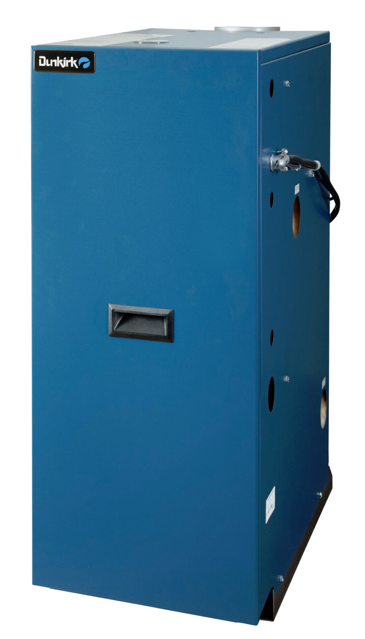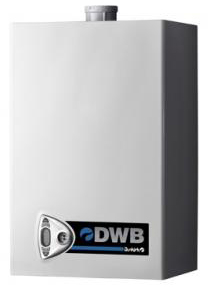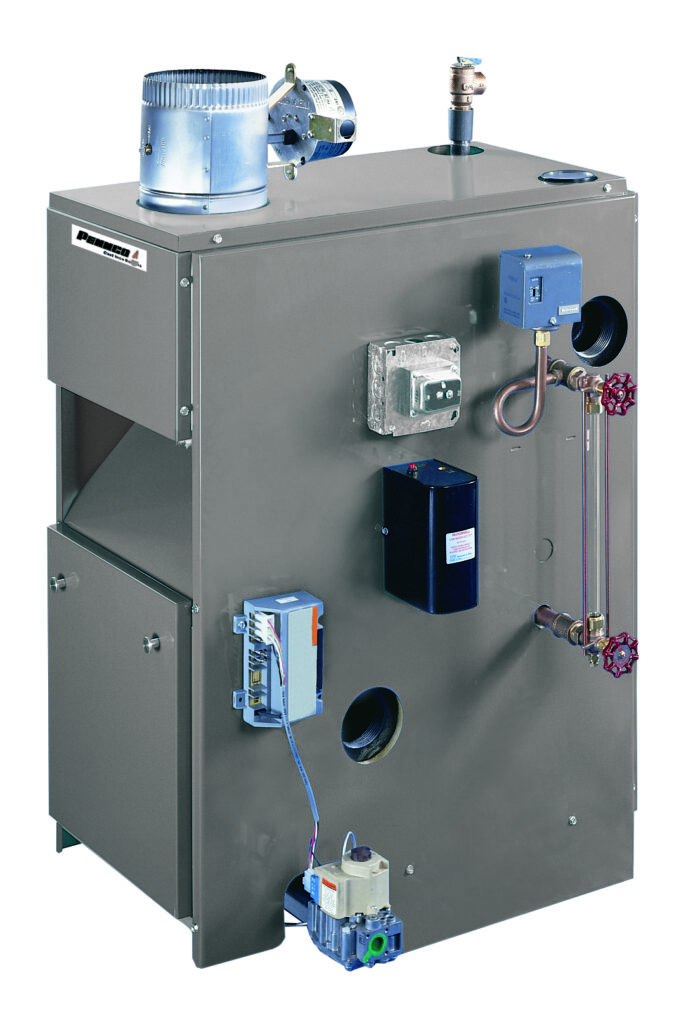The boiler is the first of the three key components in a heating system. Like a hot air furnace, a boiler is responsible for converting potential energy in a fuel source, into heat energy through the means of combustion. Unlike a furnace, where the heat energy is transferred to the living space via air, through a system of ducts, a boiler uses water as the “heat transport medium”; the heated water, or steam in the case of steam systems, is ultimately distributed to the living space through a series of pipes.
Boilers have been used for hundreds of years as a heat source. Early designs used wood or coal as their fuel sources, with efficiency rates of around 50%; meaning that roughly half of the heat energy generated was wasted through hot flue gases escaping out the chimney. Modern boilers, utilizing natural gas or propane, are capable of efficiencies nearing 100%.
Before the advent of widely-available, refined, fuel sources like natural gas or propane, wood and coal were the primary means of generating heat. This was often done in fireplaces or cast iron stoves, which heated the immediate area. The notion of “central heating” didn’t fully evolve until the late 19th century where heat could be generated in one location, and transferred to another through the use of a “medium” like air or water. Early systems relied on either gravity convection (in both hot air and hot water systems) or in the case of steam, the natural pressure generated by heating water beyond the boiling point, as a way of moving the heat through the system. As electricity became prevalent, air or water could be “forced” through a distribution system either by a blower in the case of forced air, or a circulator, in the case of a hot water system.

HOT WATER
Iron has been used in heating systems since the early days of wood and coal stoves. An incredibly durable, plentiful material, it has properties that make it ideal for a thermodynamic system. A conductive material with a high “heat capacity”, cast iron absorbs large amounts of heat energy and slowly releases it into either a heat transport medium (water) or into the living space through a radiator.
Cast iron boilers are still prevalent today, and are relied on for their simplicity, low-cost, and durability. It’s not unusual for a cast iron boiler to last 30+ years. Modern versions are capable of respectable efficiencies of around 85%. There are two types of Hot Water Cast Iron Boilers:

WALL-HUNG BOILERS
The pinnacle of modern heating technology, the wall-hung boiler is a relatively new development that offers unparalleled space and energy efficiency. As opposed to cast iron, modern wall-hung units use either stainless steel, or copper for their heat exchangers. Far lighter and more compact than a traditional cast iron boiler, wall-hung designs are highly adaptable and are an ideal choice for both new construction or updating an old system. They are packed full of safety and efficiency enhancing technology. Most include integrated low water cutoffs which automatically shut down the boiler in the event of a system leak; preventing a catastrophic failure and a potentially dangerous situation. Many new designs offer the ability to modulate their firing rate to properly match the required heat load. Due to their use of stainless steel or copper, the heat exchangers of wall-hung boilers are far more tolerant of cooler return temperatures; something that is highly detrimental to a cast iron boiler. This makes them ideal for low-temperature, high-mass systems common in radiant heat designs. A modulating, wall-hung boiler integrated into a radiant heat system is by far the most efficient form of heating possible.

STEAM BOILER
A steam boiler is a steam producing heating system. It creates energy by heating water to get steam. It is a heat exchanger that makes steam for outside usage and has a combustion chamber and water container. The several varieties of steam boilers include those that are very small and those that are large for more demanding jobs.
Things To Consider When Buying A Boiler
Whether you’re purchasing a boiler for the first time or replacing your existing one, it’s important to know what factors go into a wise purchase decision. Read on to learn what boilers are, how they differ from other heating methods, and how to choose the best boiler for your home.
A boiler is a central heating appliance that heats water in a tank (much like a conventional water heater) and distributes it through a series of pipes to various radiators throughout your home.
Depending on the boiler, it will either heat the water until it becomes steam (a steam boiler) or keep the water in its liquid state (a hot water boiler). Either can be powered by several fuel sources, including natural gas, propane, heating oil or electricity, with comparable levels of energy efficiency. If you are replacing a boiler, you must choose the same type as the original because the radiators are designed specifically for steam or hot water. Things to take into consideration when buying a boiler:
~ Fuel type
~ Up-to-date operable chimneys
~ The square footage of your home
~ What type of heat emitter are in your home e.g; baseboard or radiators
Differences Between Boilers and Other Heating Options
Boilers offer several advantages over other types of heating systems such as furnaces:
- Take up less space: wall hung boilers are a fraction of the size
- Heat more efficiently: water is a more efficient heat transmission then air
- Require less maintenance: hot water systems do not have filters that need to be changed
- Quieter operation: boilers and circulators are nearly silent in their operation
For these reasons, boilers are sometimes the central heating system of choice in colder regions where efficient heat is the primary concern and central air conditioning is not necessary.
